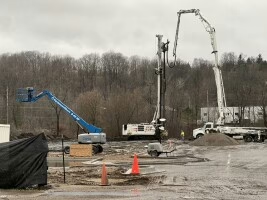Article content
London is on the verge of losing millions of dollars in provincial funding for missing its housing starts target for 2024, a goal the city could easily hit if builders followed through on all projects approved by council.
Article content
Article content
As of Oct. 31, city hall had issued building permits for 3,282 units in 2024 alone, an increase of 164 per cent compared to the same time in 2023.
Advertisement 2
Story continues below
Article content
But according to city data, construction had only started on 2,624 of those units, or about 650 fewer units than possible as of the end of October.
The fact construction hasn’t started on nearly 20 per cent of approved projects is a problem for the city because, according to internal staff projections, London should be a little below 3,850 housing starts by year’s end, which is still shy of the provincially set target of 3,917 for the city in 2024.
But it’s a target that could be surpassed if all projects that have received building permits get built, said Alan Shaw, city hall’s director of building services.
“There’s a natural lag from when you get a permit to when you actually start construction, so I think there’s some normalcy towards that,” he said. “The issue is that we have found that a lot of individuals are holding onto permits or sitting on permits and aren’t starting work.”
In some cases, construction has yet to start on projects that received city hall’s green light up to two years ago, Shaw said.
Though many factors may be at play delaying construction, on paper the industry “could start more houses than they currently have going at this point in time,” Shaw said, adding that each time the city issues a building permit for a project that isn’t completed it only adds to the “bottleneck” the city is trying to clear.
Article content
Advertisement 3
Story continues below
Article content
“The reality is that everybody wants their permits to build, and we’re trying to expedite as many permits as we can,” Shaw said. “But even if just 10 per cent (of those projects) don’t get built, that’s wasted time that we could have spent on another 10 per cent that are going to get built.”
Mike Wallace, executive director of the London Development Institute, said several factors can delay construction after a building permit is issued, including worker shortages, particularly for highrise projects that require specialized crews.
But the biggest factor that has slowed down construction of new homes, not only in London but across Canada, has been a drop in demand caused by higher interest rates, said Wallace, who’s been a critic of how long it takes city hall to approve projects and issue building permits.
“You don’t go build a building that doesn’t have a buyer,” he said. “I think we’re lagging a little bit behind there (to reach the provincial target), but we think as the marketplace improves and as availability of land improves, that things will pick up.”

Missing the target means missing out on millions of dollars in bonuses from the province, which created a system of financial incentives contingent on housing construction amid a provincial housing crisis. That money can be used toward developing and servicing new land.
Advertisement 4
Story continues below
Article content
It’s unclear how much money London would receive for hitting its target this year. But Hamilton, which has the same overall target as London of building 47,000 by 2031, received $17 million this year from Queen’s Park after surpassing its 2023 goal.
According to the province’s housing tracking, only six communities in Ontario had already surpassed their target for 2024, including Chatham-Kent, Sarnia and Windsor. Three more were on track to hit their goal by year’s end.
Though tracking housing starts is a way for the province to know exactly how many units are being built in Ontario, it’s an unfair system for municipalities, said David Amborski, a professor at Toronto Metropolitan University’s School of Urban and Regional Planning.
“That’s a very bad method for them to use because municipalities don’t control housing starts,” he said. “The developers do. They are the ones who decide when they build.
“And developers aren’t going to build if no one’s going to buy or rent the product at the end.”
It was an opinion echoed by London Mayor Josh Morgan, who pointed out this year council has approved a historic number of housing projects, representing more than 20,000 units in 2024 alone.
Advertisement 5
Story continues below
Article content
“We can permit 23,000 units in this city, and we can be sitting in numbers in the 3,000s of what actually gets permitted and built, so that’s a big gap,” he said.
“I’m not saying that all those units should come to fruition one year. That’s not reasonable to think . . . but if you want to create a program that incentivizes municipalities, then judge us on something that we have full and final and complete control over.”
Though Morgan said he’s still optimistic London will hit its mark this year, his main priority is getting more housing built in the community.
“It’s nice to have some government funding to assist with housing and infrastructure and other things,” he said. “But at the end of the day, we’re still on the same page with Londoners and our provincial and federal partners to recognize that people need places to live. People need housing and that is our main focus.”
jjuha@postmedia.com
Recommended from Editorial
Article content








Comments